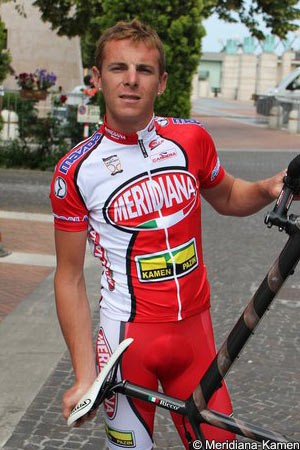Game over for rider once considered future Tour de France winner
 Riccardo Riccò’s controversial career has come to an end today with the news that the Italian National Anti-Doping Tribunal has handed the 28 year old rider a twelve year ban.
Riccardo Riccò’s controversial career has come to an end today with the news that the Italian National Anti-Doping Tribunal has handed the 28 year old rider a twelve year ban.
In doing so, the Tribunal has fully accepted the request for a sanction of this duration, as made by the public prosecutor of the Italian Olympic Committee CONI last October.
The rider did not attend today’s meeting, according to La Gazzetta dello Sport.
The sentencing statement on CONI’s website was short and to the point. “The National Anti-Doping Tribunal, in the disciplinary proceedings against Riccardo Riccò, having regard to Articles. 2.2, 10.2, 10.7 of the WADA Code and letter of the List of Prohibited Methods M1 attached to the same Code, declares the athlete guilty of the charge.
“Given the recurrence, it imposes 12 years of suspension with effect from 19/04/2012 and, given the period of suspension, with an end date of 18/01/2024.”
Riccò must also pay a penalty of €5,000 plus legal costs of €15,000.
The sanction is the second to be imposed on the climber. In 2008 he took two stages of the Tour de France but was then ejected from the race after he positive for CERA.
He was given a slightly-reduced ban of 20 rather than 24 months then as he cooperated with investigators.
Upon his return he pledged he would race clean. He worked with the Mapei Center trainer Aldo Sassi, regarded as an anti-doping advocate, and claimed that he could win the Giro d’Italia without doping.
Sassi was suffering from terminal cancer at the time, and stated that he was putting his faith in Riccò as his last big project. According to La Gazzetta dello Sport, Sassi concluded a meeting with Riccò by telling him, “I have a life expectancy that goes as far as July: you’re my last gamble.”
However Sassi passed away suddenly in December 2010. The following month Riccò promised that he would continue on in the right way. “Aldo has sadly died,” he told La Derniere Heure. “But his spirit still exists at the Mapei centre. I now work with people who worked with him these past fifteen years and using its methods. Working with Sassi has done a lot of good for my image, it’s true, but I especially want it to bear fruit.”
Those words turned out to be lies when, as the tribunal ruled today, the rider did indeed dope in February 2011. He was hospitalized early that month and allegedly admitted to medical staff that he had given himself a blood transfusion which had been stored in a refrigerator for 25 days. Riccò later denied this and said the staff were lying.
He was racing with the Vacansoleil team at the time but was fired soon after his treatment in hospital.
An investigation was launched, and he said that he was walking away from the sport to become a bartender. However he soon changed his mind and started training once again, planning a return.
Meantime the inquiry stalled in May 2011 when medical expert professor Giovanni Beduschi died suddenly due to a heart attack; it got moving again the following month when the prosecutor of Mondena sent the dossier to the anti-doping prosecutor with CONI.
Attempted return:
Determined to get back to racing, Riccò inked a deal with the small Meridiana-Kamen team. He was planning on riding the Tour of Serbia, but this became impossible when on June 8th, the Commission for Health Protection of the Italian cycling federation decided to suspend his licence.
It said it was doing so in order to safeguard his health. When that initial 60 day ban expired, Dr Francis Plotinus, the president of the National Anti-Doping Tribunal, ordered the suspension to be extended by another 30 days.
That ran out in early September, and on the 14th on that month he appeared before CONI. Riccò denied any doping at the hearing, saying again that the medical staff had lied. “We set out our alternative version,” said his lawyer Fiorenzo Alessi then, according to Tuttobiciweb. “We think we can say there was no autotransfusion.”
Alessi said that the rider was “tired of always being misunderstood,” and Riccò consequently refused to speak to the press outside the CONI offices.
The lawyer added that he would remain part of the peloton in the future. “He does not consider himself a rider [this year], said Alessi. “He will not race anymore this season, but he has no plans of stopping.”
In order to determine the truth, an immuno-haematologist, a specialist in infectious diseases and a nephrologist, or kidney doctor were appointed to study his case. The trio, the professors Giancarlo Isacchi, Giuseppe Gentile and Sandro Feriozzi, reached their decision in mid-December and submitted it to Dr Francis Plotinus, the president of the National Anti-Doping Tribunal.
He set a date of January 9th for Riccò and his legal team to make their responses. A hearing was due to be held on February 3rd, but was cancelled due to bad weather.
Meanwhile Riccò tried to take out a licence with the Croatian cycling federation, which oversees the Meridiana Kamen team. It initially listed him as being registered, but the UCI stepped in.
“Riccò is not domiciled in Croatia and the national federation has informed the UCI that they hence have refused to issue a licence for him,” UCI spokesman Enrico Carpani told VeloNation on January 23rd.
All avenues have now closed for the rider as a result of today’s ruling. Riccò, once considered the future of Italian cycling and the heir to Marco Pantani, threw away his second chance.
The Cobra is not now eligible to compete until he is 40 years of age.